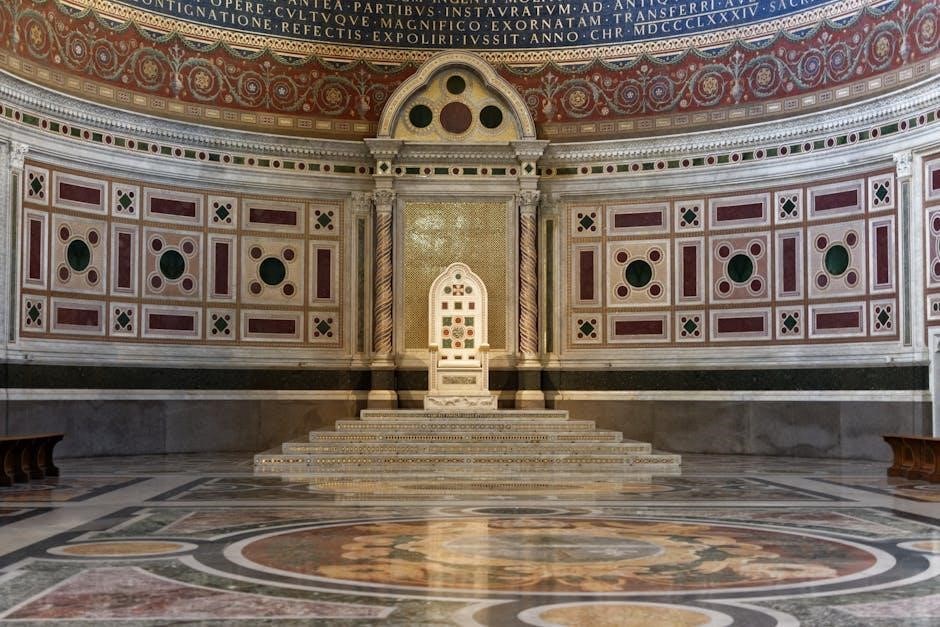“30 Steps to Heaven” by Pope Shenouda III is a profound spiritual guide‚ offering a structured path to deepen faith and attain heavenly salvation through practical steps and virtues.

Overview of “30 Steps to Heaven” by Pope Shenouda III
“30 Steps to Heaven” by Pope Shenouda III is a deeply spiritual and transformative guide designed to lead believers toward a closer relationship with God. The book is structured as a step-by-step journey‚ dividing the path to spiritual enlightenment into three main parts. It begins with foundational principles such as renunciation and detachment‚ progresses through essential virtues like faith and hope‚ and culminates in advanced spiritual practices such as contemplation and union with God. Each step is rooted in biblical teachings and offers practical advice for overcoming worldly attachments and achieving inner peace. The book emphasizes the importance of humility‚ love‚ and gratitude as cornerstones of a godly life. By following these steps‚ readers are encouraged to seek eternal life and the Kingdom of Heaven. Pope Shenouda’s wisdom provides a clear and accessible roadmap for spiritual growth‚ making it a valuable resource for both monastic and lay audiences.
The Significance of the Number 30 in Spiritual Contexts
The number 30 holds profound spiritual significance‚ often symbolizing completeness‚ divine order‚ and harmony. In biblical contexts‚ 30 is associated with maturity and readiness for spiritual missions‚ as seen in Joseph’s rise to leadership at age 30 and Jesus beginning His ministry at the same age. It also represents periods of preparation‚ such as the 30 pieces of silver in Judas’ betrayal‚ signifying sacrifice and redemption; In “30 Steps to Heaven‚” Pope Shenouda III uses this number to structure a comprehensive path to spiritual growth‚ reflecting its symbolic connection to fullness and divine purpose. The 30 steps mirror life’s journey‚ guiding believers through purification‚ virtue‚ and union with God‚ ultimately leading to eternal life and the Kingdom of Heaven. This structure emphasizes the completeness of the spiritual journey‚ aligning with the number’s deeper spiritual connotations of harmony and fulfillment.
Structure and Purpose of the Book
“30 Steps to Heaven” by Pope Shenouda III is structured into three distinct parts‚ each building upon the previous to guide believers toward spiritual maturity and union with God. The book begins with the Initial Steps to Heaven‚ focusing on foundational virtues like renunciation‚ detachment‚ and repentance‚ which prepare the soul for a deeper spiritual life. The second part‚ The Fundamental Virtues‚ explores essential Christian traits such as faith‚ hope‚ charity‚ and wisdom‚ providing practical guidance for cultivating these qualities. The final section‚ The Final Ascent to Heaven‚ leads readers into advanced spiritual practices like contemplation‚ union with God‚ and eternal life‚ emphasizing the ultimate goal of salvation. The book’s purpose is to offer a clear‚ step-by-step path to heaven‚ blending biblical teachings with practical advice‚ ensuring readers can apply these principles in their daily lives to achieve spiritual growth and harmony with God’s will.
Part I: The Initial Steps to Heaven
Part I introduces the foundational steps to spiritual growth‚ focusing on renunciation‚ detachment‚ and exile‚ guiding believers to transition from worldly attachments to a disciplined‚ God-centered life.
Step 1: Renunciation
Renunciation is the first step on the spiritual journey‚ emphasizing the voluntary detachment from worldly desires and material attachments. It calls believers to surrender their will for God’s‚ fostering humility and purity of heart. This step is not about rejecting life’s blessings but redirecting focus to eternal values. By renouncing worldly passions‚ individuals create space for divine grace‚ enabling them to walk the narrow path to heaven. Pope Shenouda III teaches that true renunciation is a conscious choice‚ freeing the soul from bondage to sin and earthly distractions. It is the foundation for spiritual growth‚ preparing the heart to embrace the subsequent steps with sincerity and devotion.
Step 2: Detachment
Detachment is the second step‚ focusing on freeing oneself from emotional and material entanglements that hinder spiritual growth. It involves letting go of worldly attachments without resentment‚ fostering inner peace and freedom. Detachment is not about rejecting relationships or possessions entirely but about not being controlled by them. Pope Shenouda III emphasizes that detachment allows believers to love and interact with others selflessly‚ without selfish desires influencing their actions. This step encourages a mindset of surrender‚ trusting God’s providence and prioritizing eternal over temporal gains. By practicing detachment‚ individuals cultivate humility and openness to divine guidance‚ preparing their hearts for deeper spiritual transformation. It is a crucial step in aligning one’s life with God’s will and advancing on the path to heaven.

Step 3: Exile
Exile is the third step‚ symbolizing a spiritual retreat from the world to focus on God. It involves voluntarily distancing oneself from sin and worldly distractions to seek a life pleasing to God. Pope Shenouda III explains that exile is not physical isolation but a state of heart‚ where one separates from harmful influences to grow spiritually. This step encourages believers to embrace purity‚ humility‚ and self-reflection‚ creating space for divine grace to work in their lives. Exile is a form of spiritual discipline‚ helping individuals detach from fleeting desires and align their will with God’s. By embracing exile‚ one prepares the soul for deeper communion with God and progresses toward heavenly life.

Step 4: Obedience
Obedience is the fourth step in Pope Shenouda III’s guide‚ emphasizing submission to God’s will and divine commandments. It is a fundamental virtue that fosters spiritual growth by aligning one’s actions with God’s teachings. Obedience is not merely external compliance but a heartfelt surrender‚ reflecting trust in God’s wisdom and love. By practicing obedience‚ believers cultivate humility and self-discipline‚ essential for overcoming pride and selfishness. This step also extends to obeying spiritual leaders and authorities‚ as St. Paul advises in Hebrews 13:17‚ trusting their guidance as part of God’s plan. Obedience becomes a pathway to freedom‚ allowing individuals to live in harmony with God’s will and advance toward eternal life.
Step 5: Repentance
Repentance is a cornerstone of spiritual growth‚ marking a turning point from sin to righteousness. Pope Shenouda III emphasizes that true repentance involves a deep sense of sorrow for past wrongs‚ a firm decision to change‚ and a commitment to avoid future sins. It is not merely a superficial apology but a heartfelt transformation that cleanses the soul. Repentance strengthens faith‚ restores relationships with God‚ and paves the way for divine forgiveness. Through repentance‚ believers acknowledge their weaknesses and humbly seek God’s mercy‚ demonstrating their willingness to live according to His will. This step is essential for spiritual renewal and serves as a foundation for advancing toward heavenly life‚ as it aligns one’s heart with God’s commandments and fosters a life of holiness and purity.
Step 6: Forgiveness
Forgiveness is a vital step in the spiritual journey‚ as it liberates the heart from the burdens of anger and resentment; Pope Shenouda III teaches that forgiveness reflects God’s mercy and love‚ enabling believers to mirror His divine nature; By forgiving others‚ one not only heals relationships but also purifies their own soul‚ creating a path for divine grace to flow. Forgiveness does not excuse wrongdoing but releases the hold it has on the forgiver‚ fostering inner peace and freedom. It is an act of obedience to God’s command to forgive as we are forgiven. This step strengthens humility‚ compassion‚ and love‚ aligning one’s heart with God’s will. Forgiveness is not optional but essential for spiritual growth‚ as it paves the way for eternal life and union with God in heaven.
Step 7: Humility
Humility is a cornerstone of spiritual growth‚ as it allows believers to recognize their true nature and dependence on God. Pope Shenouda III emphasizes that humility is not self-deprecation but a truthful assessment of oneself‚ acknowledging human limitations and the need for divine grace. It involves surrendering pride and arrogance‚ embracing a lowly heart‚ and serving others without seeking recognition. Humility fosters a deep connection with God‚ as it mirrors the humility of Christ‚ who emptied Himself for humanity. By cultivating humility‚ one becomes receptive to God’s will‚ fosters unity with others‚ and embodies the teachings of Christ. This step is essential for spiritual ascent‚ as it purifies the heart and prepares it for the reception of divine light and love‚ ultimately leading to union with God in heaven. Humility is a lifelong journey‚ requiring constant self-reflection and surrender to God’s plan.
Step 8: Love
Love is a fundamental virtue in the journey to heaven‚ as it reflects God’s nature and will. Pope Shenouda III teaches that love is not merely an emotion but a commitment to selflessly serve and care for others‚ mirroring Christ’s unconditional love. It involves compassion‚ kindness‚ and unity‚ breaking down barriers between individuals. Love is the essence of God’s commandments‚ as emphasized in Scripture‚ and it is through love that believers demonstrate their devotion to Him. By practicing love‚ one cultivates a heart of mercy and forgiveness‚ drawing closer to God and embodying His likeness. Love transcends worldly attachments and becomes a powerful force for spiritual transformation‚ leading to eternal life in heaven. It is the cornerstone of all virtues‚ enabling believers to overcome divisions and live in harmony with God and humanity. Love is the path to unity and the reflection of God’s divine presence in the world.
Step 9: Prayer
Prayer is a vital step in the spiritual journey‚ as it establishes a direct and intimate relationship with God. Pope Shenouda III emphasizes that prayer is not just a ritual but a heartfelt communication with the Divine‚ essential for spiritual growth. Through prayer‚ believers express gratitude‚ seek guidance‚ and confess their sins‚ fostering a deeper connection with God. It is a means to overcome sin‚ gain strength‚ and find peace in a chaotic world. Prayer also prepares the soul for eternal life‚ as it aligns one’s will with God’s will. The Bible and the teachings of the Church highlight prayer as a cornerstone of Christian life‚ and Pope Shenouda III encourages believers to make it a daily habit. By praying sincerely and persistently‚ one can experience the transformative power of God and draw closer to heaven. Prayer is the way of life in heaven‚ and practicing it on earth prepares the soul for eternal communion with God.
Step 10: Fasting
Fasting is a powerful spiritual practice that helps believers master their passions and draw closer to God. According to Pope Shenouda III‚ fasting is not merely abstaining from food but also from sinful desires and harmful habits. It is a means to discipline the body and soul‚ fostering self-control and spiritual growth. Fasting prepares the heart for prayer‚ repentance‚ and a deeper relationship with God. By denying worldly comforts‚ one learns to rely on God’s grace and find strength in humility. Pope Shenouda III teaches that fasting is a way to imitate Christ’s sacrifice and purify oneself for eternal life. It is a step that cleanses the spirit‚ making it ready to receive divine light and wisdom. Through fasting‚ believers can overcome earthly attachments and focus on their ultimate goal: union with God in heaven. This practice is essential for those seeking spiritual renewal and a life of holiness.

Part II: The Fundamental Virtues
This section explores essential virtues like faith‚ hope‚ and charity‚ guiding believers to embrace a life of moral integrity and spiritual growth‚ leading to a deeper union with God.
Step 11: Faith
Faith is the cornerstone of the spiritual journey‚ enabling believers to trust in God’s will and divine plan. It is the foundation of all virtues‚ as it connects humanity to the heavenly realm. Pope Shenouda III emphasizes that faith is not merely intellectual assent but a heartfelt commitment to God’s promises. True faith manifests in obedience‚ perseverance‚ and surrender to God’s sovereignty. Without faith‚ one cannot navigate the challenges of the spiritual path or attain union with God. It is through faith that believers gain strength to overcome doubts and trials‚ ultimately leading to a deeper relationship with the Divine. This step underscores the necessity of cultivating unwavering faith as a prerequisite for spiritual growth and eternal salvation.
Step 12: Hope
Hope is a vital virtue that sustains the soul on its journey to heaven‚ providing strength and consolation in times of adversity. Pope Shenouda III teaches that hope is the expectation of eternal life and the fulfillment of God’s promises. It is not mere optimism but a confident trust in God’s providence and mercy. Hope enlightens the mind‚ dispels despair‚ and inspires perseverance in the face of challenges. Rooted in faith‚ hope transforms earthly struggles into opportunities for spiritual growth. By anchoring our hearts in hope‚ we remain steadfast in our pursuit of holiness and salvation‚ trusting that God’s plan will ultimately prevail. This step emphasizes the importance of nurturing hope as a divine gift that guides us toward eternal joy and union with God.
Step 13: Charity
Charity‚ or love in action‚ is a cornerstone of spiritual growth‚ as it reflects God’s divine love for humanity. Pope Shenouda III emphasizes that charity is not merely giving material aid but also encompasses compassion‚ kindness‚ and selflessness. It is the heart of Christianity‚ as it mirrors Christ’s unconditional love. Through charity‚ believers demonstrate their commitment to serving others and honoring God. This step encourages believers to go beyond mere donations‚ focusing on heartfelt acts of mercy and humility. Charity purifies the soul‚ fosters unity‚ and brings joy to both the giver and receiver. By practicing charity‚ one cultivates a deeper connection with God and embodies His love in the world. It is a vital step in the journey to heaven‚ as it prepares the heart for eternal fellowship with God.
Step 14: Temperance
Temperance‚ as a virtue‚ calls for balance and moderation in all aspects of life. Pope Shenouda III teaches that it is essential to avoid extremes‚ whether in desires‚ emotions‚ or actions. By practicing temperance‚ one learns to control passions and maintain harmony in their spiritual and physical being. It is a virtue that fosters self-discipline and enables individuals to prioritize eternal values over fleeting worldly pleasures. Temperance is not about repression but about living a life governed by wisdom and God-centered principles. This step encourages believers to cultivate inner peace and stability‚ ensuring that their lives reflect the order and harmony of God’s creation. Through temperance‚ one becomes a vessel of God’s grace‚ better equipped to navigate life’s challenges while keeping their eyes fixed on heaven.
Step 15: Courage
Courage‚ as emphasized by Pope Shenouda III‚ is the strength to stand firm in faith and face life’s challenges with unwavering resolve. It is not the absence of fear but the willingness to act despite it‚ rooted in trust in God’s providence. Courage enables believers to endure persecution‚ remain steadfast in their convictions‚ and boldly share their faith with others. It is a virtue that transforms fear into confidence and doubt into certainty. By cultivating courage‚ one embodies the spirit of Christ‚ who faced the ultimate trial with courage and love. This step reminds us that true courage is not self-reliance but reliance on God’s power‚ making it a cornerstone of the spiritual journey toward heaven. Through courage‚ believers overcome worldly anxieties and align their wills with God’s divine plan.
Step 16: Justice
Justice‚ as taught by Pope Shenouda III‚ is a foundational virtue that reflects God’s divine order and fairness. It calls believers to act with integrity‚ ensuring equality and righteousness in all interactions. Justice is not merely a human concept but a divine attribute‚ as God is just and expects His followers to emulate this trait. Practicing justice involves treating others with honesty‚ respecting their rights‚ and avoiding oppression. It also extends to self-reflection‚ ensuring one’s intentions and actions align with moral principles. Justice is a balance between mercy and accountability‚ guiding individuals to uphold what is right in both personal and societal contexts. By embracing justice‚ believers foster harmony and peace‚ drawing closer to God’s will. This step emphasizes that true justice is rooted in love and humility‚ reflecting Christ’s teachings and enabling believers to live in accordance with His divine plan.
Step 17: Wisdom
Wisdom‚ as emphasized by Pope Shenouda III‚ is the divine insight and understanding that guides believers to live according to God’s will. It is the ability to discern right from wrong‚ rooted in spiritual knowledge and experience. Wisdom is not merely intellectual understanding but a gift from God‚ enabling individuals to navigate life’s challenges with grace and virtue. It involves applying biblical teachings to everyday situations‚ making decisions that align with heavenly values‚ and cultivating a deep connection with God. Through wisdom‚ believers gain clarity in their spiritual journey‚ avoiding worldly temptations and focusing on eternal truths. Wisdom also fosters humility‚ as it recognizes the limitations of human knowledge and relies on divine guidance. By embracing wisdom‚ individuals grow in spiritual maturity‚ reflecting God’s light in their thoughts‚ words‚ and actions‚ and drawing closer to the heavenly kingdom.
Step 18: Purity
Purity‚ as taught by Pope Shenouda III‚ is a vital step in the spiritual journey‚ representing a state of being free from sin and worldly corruption. It involves cleansing both the heart and mind‚ ensuring that one’s thoughts‚ actions‚ and intentions align with God’s will. Purity is not just external behavior but an internal transformation‚ reflecting a deep commitment to holiness. It requires avoiding impure thoughts‚ desires‚ and influences‚ and instead seeking righteousness in all aspects of life. Through purity‚ believers become temples of the Holy Spirit‚ enabling them to draw closer to God and reflect His divine light. Purity also fosters humility‚ as it acknowledges human frailty and the need for divine grace. By embracing purity‚ individuals embody the virtues of heaven‚ preparing themselves for eternal life in God’s presence.
Step 19: Compassion
Compassion‚ as emphasized by Pope Shenouda III‚ is a cornerstone of Christian living‚ reflecting God’s boundless mercy and love for humanity. It involves showing empathy‚ kindness‚ and concern for others‚ especially those suffering or in need. Compassion is not merely an emotion but a call to action‚ encouraging believers to alleviate the burdens of others. Rooted in Christ’s teachings‚ compassion mirrors His ministry of healing and mercy. By embracing compassion‚ individuals demonstrate their love for God and neighbor‚ fulfilling the commandment to “love one another as I have loved you.” Cultivating compassion strengthens spiritual growth‚ fostering humility and selflessness. It also deepens one’s connection to God‚ as acts of compassion are seen as acts of worship. Through compassion‚ believers embody the heart of Christ‚ paving their path to heaven.
Step 20: Gratitude
Gratitude is a vital virtue in the spiritual journey‚ as emphasized by Pope Shenouda III. It involves acknowledging and appreciating God’s blessings in all circumstances. By cultivating gratitude‚ believers foster a positive spirit and contentment‚ recognizing God’s presence in their lives. Gratitude strengthens one’s relationship with God‚ transforming everyday moments into acts of worship. It also serves as a shield against negativity and dissatisfaction. Practicing gratitude leads to humility and trust in God’s providence‚ essential for spiritual growth. This step encourages believers to reflect on their blessings and express thanks continually‚ deepening their faith and drawing closer to heaven.

Part III: The Final Ascent to Heaven
This section marks the culmination of the spiritual journey‚ guiding believers toward a deeper union with God‚ eternal life‚ and the kingdom of heaven through contemplation and divine communion.
Step 21: Contemplation
Contemplation is a profound step in the spiritual journey‚ where one seeks to quiet the mind and focus solely on God. It involves introspection and meditation‚ allowing believers to transcend worldly distractions and connect deeply with the divine. Pope Shenouda III emphasizes that contemplation is not merely intellectual reflection but a heartfelt communion with God. Through this step‚ individuals cultivate a sense of awe and reverence‚ fostering a deeper understanding of God’s love and wisdom. Contemplation also prepares the soul for union with God‚ enabling believers to embrace eternal life and the kingdom of heaven. This step is crucial for those nearing the final ascent‚ as it strengthens their resolve and purifies their intentions‚ aligning them with God’s will. It is a sacred pause from earthly concerns‚ inviting the spirit to soar in divine light and truth. Contemplation‚ therefore‚ is a bridge between earthly life and heavenly realities‚ guiding the faithful toward spiritual maturity and fulfillment.
Step 22: Union with God
Union with God represents the pinnacle of the spiritual journey‚ where the believer achieves a profound and intimate connection with the divine. This step transcends mere contemplation‚ as it involves a complete surrender of the self to God’s will. Pope Shenouda III describes this union as a state of perfect harmony‚ where the individual will aligns with God’s purpose‚ and the soul is filled with divine love and peace. It is a transformative experience that erases the sense of separation between the believer and God‚ fostering a deep sense of oneness. This union is not a temporary state but a permanent dwelling in God’s presence‚ reflecting the ultimate goal of the spiritual ascent. Through this step‚ the believer embodies the teachings of Christ‚ living in accordance with His commandments and exemplifying His love. Union with God is the fulfillment of the journey‚ preparing the soul for eternal life and the kingdom of heaven.

Step 23: Eternal Life

Eternal Life is the ultimate fulfillment of the spiritual journey‚ where the soul experiences the divine presence of God forever. According to Pope Shenouda III‚ eternal life is not merely an endless existence but a vibrant‚ abundant life lived in complete unity with God. This step emphasizes the believer’s transition from earthly life to a heavenly state‚ where they dwell in the eternal kingdom. It is characterized by unbroken communion with God‚ freedom from sin‚ and the full realization of divine love. Eternal life is a gift granted to those who have faithfully followed the path of repentance‚ virtue‚ and union with God. It is the culmination of the 30 steps‚ where the believer’s spirit is fully transformed‚ reflecting the image of Christ. In this state‚ the soul rejoices in the presence of the Father‚ living a life of eternal praise‚ worship‚ and fellowship with the saints.
Step 24: The Kingdom of Heaven
The Kingdom of Heaven is the ultimate destination of the spiritual journey outlined in Pope Shenouda III’s “30 Steps to Heaven.” It represents a state of eternal fellowship with God‚ where believers live in His divine presence. This kingdom is not merely a physical place but a spiritual realm where love‚ peace‚ and joy reign supreme. Entry into the kingdom requires living according to God’s will‚ maintaining faith‚ and adhering to the virtues and steps previously outlined. The kingdom is characterized by eternal life‚ where the soul experiences the fullness of God’s glory. It is a place of no sorrow‚ pain‚ or death‚ where believers are united with Christ and the saints. The kingdom is both a present reality for those who walk in God’s ways and a future hope to be fully realized after earthly life. It is the culmination of the believer’s journey‚ where they inherit eternal life and dwell in the presence of God forever.
